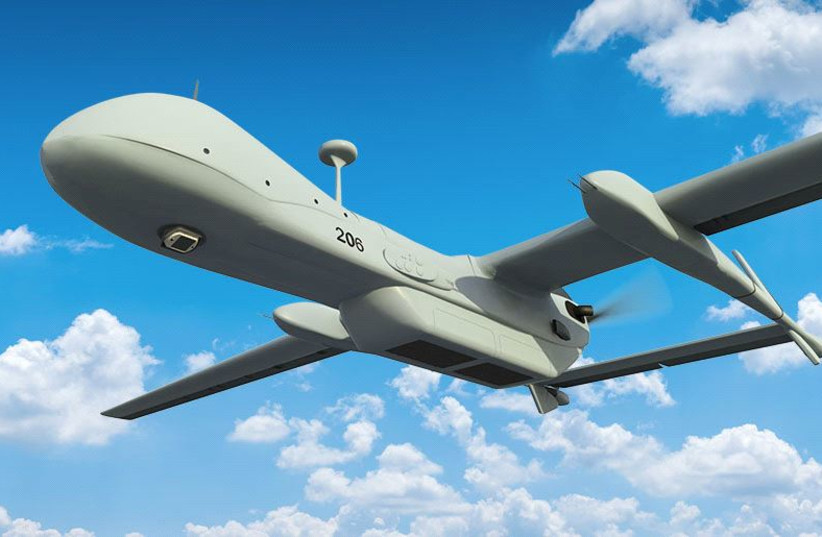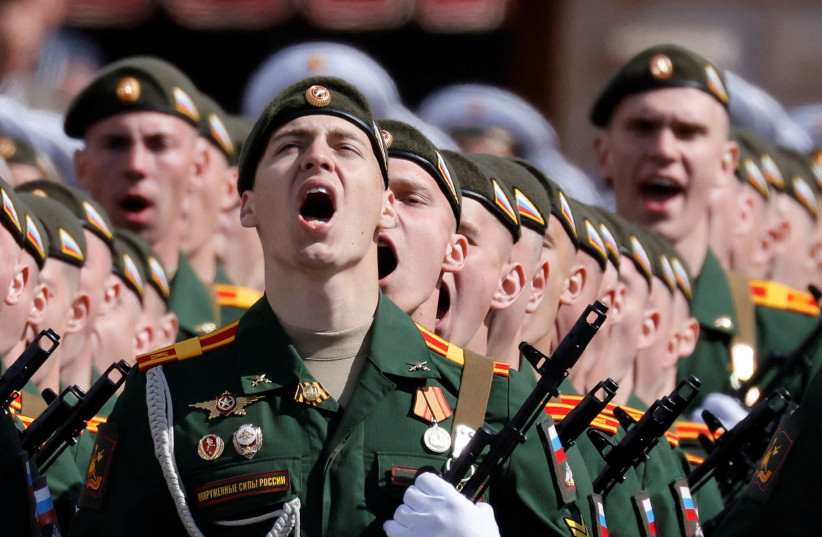When the Russian army invaded on February 24, the odds seemed stacked against the Ukrainian forces, which were significantly weaker in manpower, weapons, and combat doctrine.
For more stories from The Media Line go to themedialine.org
Eighty days later, the world sees the Ukrainian military in a different light. The Ukrainians have managed to hold off the Russian army and even push it back on many fronts.
There are many lessons to be learned from this.
Omer Dostri, a researcher at the Jerusalem Institute for Strategy and Security and an expert on national security and military strategy, told The Media Line the success of the Ukrainian army stems mainly from the mass use of inaccurate artillery, anti-tank missiles, and unmanned aerial vehicles (UAVs).

The Ukrainians have made very innovative use of UAVs against Russian armored convoys and force concentrations, he noted.
Dostri added, however, that “it should be noted that significant use of UAVs has been made before, for example in the framework of the Second Nagorno-Karabakh War [between Azerbaijan and Armenia] in September-November 2020.”
Professor Danny Orbach, a military historian at the Hebrew University of Jerusalem, said the Ukrainians’ strategy is one of the main factors behind their success.
“The Ukrainian army’s strategy fell into a very curious combination between centralized and decentralized strategy,” he told The Media Line.
Officers in both countries’ militaries inherited the tradition of centralized Soviet doctrine, where operational decisions are dictated from the top down, Orbach noted.
The Russian army has continued to follow this doctrine, he continued, following “irrelevant and un-updated plans conceived under a centralized lens. Its junior commanders who were in the field don’t ever think of modifying plans dictated from above.”
The Ukrainian army, on the other hand, evolved past the centralized Soviet doctrine and developed a highly decentralized strategy, Orbach said.
“Decentralized” does not mean that there is nothing ordered from above, he stressed. The Ukrainian army has a coherent, centralized strategy, which is mainly to draw the Russian forces in, wear them down through attrition, and engineer counterattacks.
“I think the strength of the Ukrainian army is that it developed a very strong band of what military experts call Auftragstaktik [mission command], which is a German term that means that junior commanders on the ground have a lot of leeway to change plans because they’re familiar with what happens in the field,” he continued.
According to Orbach, Ukrainian units are successful because they can adjust tactics as they see fit, while the Russians are much less flexible. “We see that Ukraine is winning engagements again and again and is able to impose attrition on the Russian army,” he added.
It is a matter of flexibility, “because if you can change your plans and the enemy cannot change its plans or can do it with much more difficulty, it’s easier for you to ambush, outflank, and change plans at the last moment in order to confuse the enemy,” Orbach said.
This decentralization can also be seen in the purchase of weapons and equipment, he stressed.
During the war, many Ukrainian unit commanders collected donations and purchased the needed equipment independently, rendering the process faster, more effective, and more accurate, Orbach explained.
Dostri added that the Ukrainian forces also benefit from greater resilience and higher morale than the Russians because they are fighting for their homeland.
The Russians’ morale is indeed low, Orbach confirmed. “It is an army which is very tired, very top-down and very inflexible,” he said.
Dostri believes that Israel can learn mainly from the Ukrainian army’s use of asymmetric warfare, including missile launches against tanks and UAVs against logistics mobility and concentrations of forces in the field.
Israel might be able to learn valuable lessons for use in a war against Hizbullah in Lebanon, or in a “First Northern War” that would also include the Syrian arena, he suggested.
In such a scenario, he said, the IDF “may face asymmetric warfare that involves the use of military tactics similar to those used by the Ukrainian army, which is significantly weaker than the Russian army,” Dostri added.
However, Uzi Rubin, former director of the Israeli Defense Ministry’s Missile Defense Organization, told The Media Line it is too soon to draw lessons from the war.
“It’s hard to say at this moment because it’s really hard to directly apply the experience of a Russian war to Israel’s security environment. It’s a different battlefield and a different kind of war,” said Rubin.
Still, Orbach pointed to some lessons that could be learned by the IDF from the war.
Israel is good in mission command; it has this doctrine of flexibility although not to the same degree as the Ukrainians, he said.
Still, Israel’s focus should be on improving logistics.
The Russian army failed because of poor logistics. The Ukrainians are succeeding because of their logistical system, which is better but also very chaotic, he explained.
“I think the IDF has some very serious logistics problems, and it has to work on this very hard,” said Orbach.
He added that improving operational flexibility could still be a game-changer for the IDF.
“If the Israeli wants to be as flexible as the Ukrainian army, it has to train a lot to function in conditions of uncertainty, of mission command, which also demands improving the training of the reserve forces,” he said.
Rubin said, however, that the lessons could be learned in both directions. “The Ukrainians were obviously not entirely prepared and ready for the Russian attack,” he said.
He added that they prepared their army very late in the game despite all the warnings from the West and from the intelligence that there was going to be an attack.
“Many Ukrainian commanders said that they got the order to prepare for an attack only a few hours before the Russians invaded so they were surprised. That’s not a good lesson,” Rubin continued.
Orbach also noted that there are also things to be learned from the Russian failure.
Parachuting troops inside enemy territory may be a very bad idea if the enemy knows to fight, he said. “The Russians tried it several times and they failed miserably in many cases.”
Lastly, Orbach suggested that Israel should invest more in infantry and armor. “In this war, we saw the need to exercise more troops in combined arms, very careful warfare with infantry and air forces, and everybody should be well-coordinated,” he said.
Israel is too used to fighting high-tech wars mainly with the air force and commando units, he said. Israel needs to spend more resources preparing for conventional war, with infantry and armored forces, he stressed.
“The Ukrainian war has shown that conventional wars are not a thing of the past, notwithstanding what all sorts of analysts had said,” Orbach said.
Rubin said the Ukrainians were well prepared to defend Kyiv and very smartly counter-attacked. This destroyed the Russian war plan, which was to take Kyiv and finish the war very quickly, he said.
However, he believes the war is far from over.

“I think the Russians have the power to sustain it for quite a long time. It seems Russia is bent on making achievements and it doesn’t care how long it takes,” he said.
The Ukrainians think it may end by the end of the year, but one shouldn’t rule out it lasting much longer, Rubin said.
